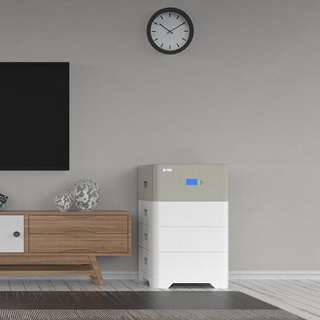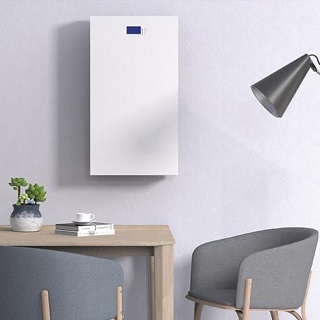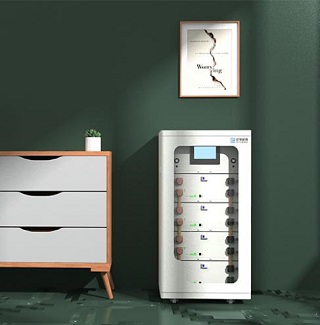When you think of batteries, you probably first think of using disposable batteries for everyday appliances, such as TV remote controls. But what you may not have known is that by using (much larger) batteries, you can power your entire home. This is the core value proposition of a modern household energy storage battery.
Whether you are often troubled by power outages, want to reduce electricity bills, or want to control power transmission independently to achieve energy independence and peak and valley arbitrage, household energy storage batteries are the ideal choice for your home power supply. You don't need a complicated home solar panel system to enjoy the benefits of batteries, but you'll get more out of it if you combine batteries with your solar panel system, especially if your utility company doesn't pay for it. When excess electricity is generated by solar panels.
We'll break it down for you, how to tell if a backup battery is right for your needs, and how to get the best price for a battery system that suits your situation from a trusted household energy storage battery supplier.
A solar home energy storage system is a system that converts solar energy into electricity and stores it. The system is usually made up of photovoltaic panels, energy storage cells, inverters, and control systems.
Photovoltaic panels are a device that uses solar energy to generate electricity, usually consisting of a series of photovoltaic cells that can convert solar energy into electricity. This generated electricity can either be used immediately or stored for later use, which is where pairing with a household energy storage battery becomes essential for maximizing self-consumption. Photovoltaic panels have a wide range of applications in domestic, commercial and industrial power, as well as public facilities and renewable energy projects.
The power generation efficiency of photovoltaic panels depends on multiple factors, including light intensity, temperature, Angle and pollution degree. Under normal circumstances, the photovoltaic panels can work at any angle, but the optimal angle is perpendicular to the direction of the sun's light. In heavily polluted cities or industrial areas, the efficiency of photovoltaic panels may be affected because pollutants cover the surface of photovoltaic cells, affecting their ability to absorb solar energy. Regardless of these variables, the value of the energy you do capture is secured when connected to a system provided by a reliable household energy storage battery supplier, ensuring no generated watt goes to waste.
Energy storage battery is a battery that can store electricity and release it when needed. They are usually composed of lithium-ion batteries, lead-acid batteries, nickel-metal hydride batteries, with the advantages of high energy density, long life, environmental protection and so on. Household solar batteries are becoming increasingly popular for their ability to store excess solar energy for use during non-sunlight hours. Modern energy storage solutions often utilize stackable lithium batteries, which allow for flexible capacity expansion and efficient space utilization.



1. ECE-stacked 20 KWh home energy storage battery. 2. ECE-5 KWh solar battery. 3. ECE-20 KWh cabinet solar energy storage
An inverter is a kind of power electronic device that converts DC power supply to AC power supply. It is usually composed of semiconductor switching devices, such as transistors, field effect tubes, etc., by controlling the switch to convert direct current into alternating current. According to the connection mode of the inverter and the power grid, the home energy storage system can be divided into the following types:
(1) Grid-connected system, photovoltaic and energy storage system can be connected to the power grid, and the power can be purchased from the power grid when the photovoltaic or battery power is insufficient.
Suitable for the power system stability, relatively low electricity price area.
(2) The off-grid system is suitable for desert, islands and other areas without power grid or areas where the power grid is unstable and needs self-use.
An off-grid energy storage converter, usually with a diesel generator interface to replenish power at night when the battery is insufficient.
(3) The off-grid all-in-one machine, with the function of off-grid switching or integrating grid-connected and off-grid mode in one machine, can complete the switch into off-grid mode in case of power failure, which is suitable for areas with unstable power system and frequent power failure.
The control system is used to control the operation of the whole system to ensure the stability and safety of the photovoltaic home energy storage system.
ECE ENERGY is a professional developer and manufacturer of home energy storage systems dedicated to providing advanced energy storage solutions to consumers around the world. We have many years of research and development experience and first-class manufacturing processes to provide safe, reliable and efficient energy storage systems for the home.
The lithium iron phosphate photovoltaic cells we provide not only have a long life, stable performance, but also have high energy density and excellent electrochemical properties. These cells can effectively store solar energy and provide electricity when needed, helping households reduce their reliance on traditional power grids. These systems can meet the needs of different families, whether it is urban apartments, suburban housing or country houses, we can provide suitable solutions.
Our products are designed and manufactured to be environmentally friendly and sustainable, and all energy storage systems are strictly quality-controlled and tested to ensure that they operate stably under a variety of conditions. The electrical storage cabinet we offer provides a safe and organized housing for the entire system, making it ideal for both indoor and outdoor installations. We are convinced that by using our energy storage systems, households can make better use of renewable energy and achieve energy self-sufficiency while contributing to protecting the earth's environment.
A residential PV energy storage system is a system that utilizes solar photovoltaic to generate electricity and stores the excess power for home use. It usually consists of solar PV panels, hybrid inverter, battery storage system and an intelligent control system. The solar PV panel converts solar energy into DC power and the inverter converts DC power into AC power for home appliance use. When the PV power generation exceeds the household electricity consumption, the excess power can be stored in the lithium or lead acid battery; when the PV power generation is insufficient or at night, the power in the battery can be output to the household load through the inverter.
In recent years, with the growing importance of environmental protection and renewable energy, PV + energy storage technology has gradually become a hot topic in the global energy field,in order to meet the real-time demand for energy and balance the energy supply.Actually many houses have installed solar system without energy storage system since 10 years ago in USA,Australia,German,Netherland,Spain and many other countries .As lithium energy storage technique improve and become mature,more and more families decide to add the energy storage lithium batteries in USA and German to get independant energy and reduce electricity bills.Especially the Russo-Ukrainian War in 2022, has had a significant impact on electricity prices in Europe, leading to a general increase in electricity prices.Which makes more people know the importance of independant solar energy storage system. and after that Europe countries have imported lots of LiFePo4 residential energy storage batteries.
(1) Saving energy costs: Utilizing solar power to generate electricity reduces reliance on the traditional power grid and lowers electricity bills. At the same time, excess power is stored in battery storage system for use at night or on cloudy days, further improving energy utilization efficiency.
(2) Emergency Backup Power: In the event of a power outage or emergency, the home PV energy storage system can be used as a backup power source to provide electricity supply. This helps to safeguard the family's basic living needs and safety.
(3)Environmentally sustainable: Solar energy is a clean, renewable energy source, and the use of home PV energy storage systems can reduce dependence on fossil fuels, lower carbon emissions, and be friendly to the environment.
(4) Improved economic efficiency: By storing excess solar energy and releasing it when needed, households can utilize solar energy resources more efficiently, thereby reducing electricity bills. In addition, policies in some regions provide subsidies or tax incentives for users who install PV energy storage systems.
(5) Improve energy efficiency: By precisely controlling the charging and discharging process and managing battery status, home PV energy storage systems can maximize energy efficiency. This helps to extend battery life and reduce maintenance costs.
Install photovoltaic energy storage systems for your own home or company to save money and stabilize electricity consumption
Find a stable and reliable factory to assist you in expanding the market locally
Professional technical team and reliable energy storage products to provide a guarantee for your engineering project